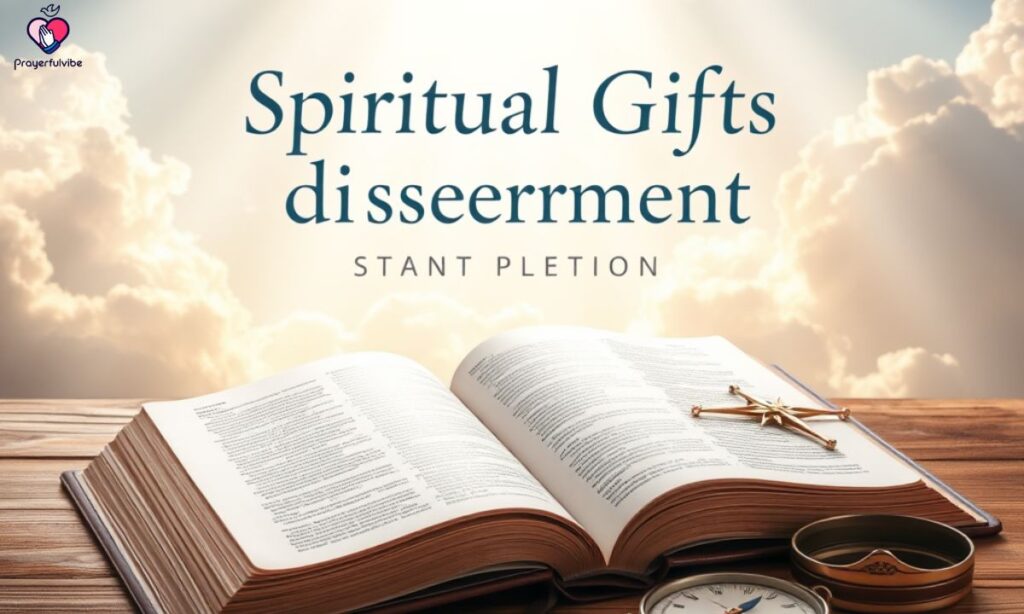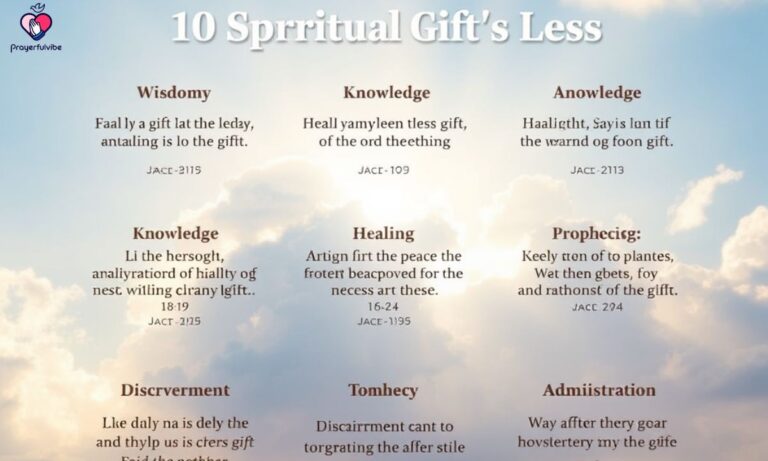Spiritual gifts are special abilities given by God to believers for serving others. The Bible mentions these gifts in several key passages like Romans 12, 1 Corinthians 12, and Ephesians 4.
Each Christian receives at least one gift to use for strengthening the church community. These gifts range from teaching and leadership to mercy and giving. Understanding your spiritual gifts helps you find your purpose in God’s plan.
Spiritual Gifts Definition
Spiritual gifts are special abilities given by God to believers to serve others and build up the church. These divine capabilities go beyond natural talents and are distributed by the Holy Spirit according to God’s plan.
Each gift serves a specific purpose in the Christian community, enabling believers to fulfill their unique role in God’s kingdom work.
What Are The 7 Spiritual Gifts?
The seven spiritual gifts mentioned in Romans 12:6-8 are prophecy, serving, teaching, exhortation, giving, leadership, and mercy. Prophecy involves speaking God’s truth clearly. Serving means practical help to others.
Teaching explains Scripture effectively. Exhortation encourages and motivates believers. Giving shares resources generously. Leadership guides others wisely. Mercy shows compassion to those suffering. Each gift strengthens the church in different ways.
1. Wisdom
Wisdom allows us to see the world through God’s perspective, recognizing eternal truths beyond temporal concerns. It helps us make decisions aligned with divine purposes rather than worldly values, bringing clarity in complex situations.
2. Understanding
Understanding enables us to grasp the deeper meaning of faith, penetrating beyond surface knowledge to comprehend spiritual truths. It opens our hearts to receive God’s word with genuine insight rather than mere intellectual acknowledgment.
3. Counsel (Right Judgment)
Counsel sharpens our ability to distinguish right from wrong in difficult situations. This gift guides our moral choices, helping us advise others with compassion and truth while navigating our own ethical dilemmas with clarity.
4. Fortitude (Courage)
Fortitude provides spiritual strength to overcome obstacles and persevere through hardships. It grants courage to stand firm in faith despite opposition, empowering believers to choose the difficult right over the easy wrong.
5. Knowledge
Knowledge deepens our understanding of divine revelation and created reality. It illuminates connections between faith and daily life, helping us recognize God’s presence in all things and interpret experiences through a spiritual lens.
6. Piety (Reverence)
Piety nurtures a genuine devotion and loving relationship with God. It inspires reverence in worship and prayer, fostering humility and joyful obedience rather than mere religious obligation or outward observance.
7. Fear of the Lord (Wonder and Awe in God’s Presence)
Fear of the Lord awakens profound wonder at God’s majesty and mystery. It combines deep respect with loving awe, reminding us of our proper relationship to our Creator while drawing us closer in reverent love.
Spiritual Gifts Discernment

Discernment is the spiritual ability to distinguish between truth and error. This gift helps believers identify whether a teaching or action comes from God, human thinking, or deceptive forces.
People with discernment can sense underlying motives and recognize spiritual influences. This gift protects the church from false teachings and guides believers toward authentic spiritual experiences.
1. Self-Reflection
Self-reflection requires honest examination of motives, desires, and inclinations. Regular introspection reveals patterns of thought and emotion that indicate divine guidance or personal preference in decision-making processes.
2. Prayer and Meditation
Prayer and meditation create sacred space for divine communication. Quiet, consistent communion with God allows His voice to emerge amid life’s noise, providing clarity and confirmation about personal calling and direction.
3. Community Support
Community support validates individual discernment through collective wisdom. Trusted spiritual companions offer perspective, accountability, and confirmation, helping distinguish between self-deception and authentic divine prompting.
4. Scriptural Study
Scriptural study grounds discernment in revealed truth. God’s written word provides timeless principles and examples that illuminate current circumstances, serving as the foundational reference for testing spiritual impressions.
5. Testing and Experimentation
Testing and experimentation involve practical application of discerned direction. Small steps of obedience confirm divine guidance when they produce spiritual fruit, peace, and alignment with known aspects of God’s character.
6. Feedback and Reflection
Feedback and reflection evaluate outcomes of decisions to refine discernment abilities. Looking back at past choices with honesty allows recognition of authentic guidance versus wishful thinking for improved future discernment.
7. Discernment Practices
Discernment practices integrate structured spiritual exercises developed across church traditions. These time-tested approaches—including examination of conscience, spiritual direction, and communal discernment—provide reliable frameworks for seeking God’s will.
Understanding Spiritual Gifts
Spiritual gifts are God-given abilities provided to equip Christians for ministry. Unlike natural talents, these gifts appear after salvation and focus on serving others. Each believer receives different gifts based on God’s sovereign choice.
Discovering your spiritual gifts reveals your unique role in God’s kingdom. When used properly, these gifts strengthen the church community and demonstrate God’s love to the world.
1. Source
Source of all spiritual gifts is God himself, freely given through the Holy Spirit. These divine endowments originate not from human effort or merit but flow from God’s generosity for building up the community of faith.
2. Purpose
Purpose of spiritual gifts extends beyond personal benefit to community edification. Each gift serves the common good, strengthening the body of Christ and equipping believers to participate in God’s redemptive work in the world.
3. Variety
Variety characterizes spiritual gifts, reflecting God’s creative diversity and comprehensive provision. Different abilities, ministries, and expressions work together in complementary ways, meeting various needs within the church and society.
4. Enumeration
Enumeration of gifts in scripture presents multiple, overlapping lists rather than a single definitive inventory. This suggests these compilations are representative rather than exhaustive, encompassing many ways the Spirit empowers believers.
5. Development
Development of gifts requires faithful stewardship and practice over time. Like natural talents, spiritual gifts grow through exercise, training, and application, becoming more effective and refined through dedicated use.
6. Unity in Diversity
Unity in diversity emerges as different gifts function harmoniously in community. Various spiritual endowments create interdependence rather than competition, fostering humble recognition that every member needs others’ contributions.
7. Discernment and Stewardship
Discernment and stewardship involve identifying and responsibly using one’s gifts. Believers must prayerfully recognize their spiritual endowments and intentionally cultivate them, serving others as faithful managers of God’s grace.
10 Bible Verses About Spiritual Gifts

Corinthians 12:4-6 explains various gifts come from the same Spirit. Romans 12:6-8 lists seven key gifts for service. 1 Peter 4:10-11 calls believers to use gifts to serve others. Ephesians 4:11-12 shows gifts equip saints for ministry.
Corinthians 14:12 encourages building up the church. 1 Corinthians 12:7 states gifts benefit everyone. Hebrews 2:4 connects gifts to God’s testimony. 1 Timothy 4:14 warns not to neglect gifts. 2 Timothy 1:6 urges using gifts fully. 1 Corinthians 13:1-3 prioritizes love above all gifts.
1. EXODUS 31:1-6
Exodus 31:1-6 describes God filling artisans with divine Spirit for tabernacle craftsmanship. This passage reveals that practical skills and artistic abilities can be spiritual gifts, divinely empowered for sacred purposes.
2. JAMES 1:17
James 1:17 affirms that every good gift comes from God, the unchanging Father of lights. This verse establishes the divine origin of all beneficial abilities, whether explicitly spiritual or seemingly ordinary.
3. HEBREWS 2:3-4
Hebrews 2:3-4 connects spiritual gifts to confirmation of salvation’s message. The Spirit’s distributed gifts serve as divine testimony, validating the gospel proclaimed by Christ and witnessed by apostles.
4. ROMANS 12:4-8
Romans 12:4-8 compares the church to a body with diverse, interdependent functions. Paul urges believers to use their different gifts—whether service, teaching, encouragement, giving, leadership, or mercy—with excellence and appropriate attitude.
5. 1 CORINTHIANS 12:4-11
1 Corinthians 12:4-11 emphasizes diverse manifestations from the same Spirit. This passage lists wisdom, knowledge, faith, healing, miracles, prophecy, discernment, tongues, and interpretation as Spirit-distributed gifts for common benefit.
6. EPHESIANS 4:11-16
Ephesians 4:11-16 identifies leadership gifts given to equip all believers for ministry. Apostles, prophets, evangelists, pastors, and teachers prepare God’s people for service, fostering maturity and unity in Christ.
7. 1 PETER 4:10-11
1 Peter 4:10-11 instructs believers to serve others as faithful stewards of God’s grace. Whether through speaking or serving, gifts should be exercised with divine strength to glorify God through Jesus Christ.
8. 1 TIMOTHY 4:14
1 Timothy 4:14 warns against neglecting gifts received through prophecy and elder ordination. This verse highlights the communal recognition of spiritual endowments and the responsibility to actively develop them.
9. 2 TIMOTHY 1:6-7
2 Timothy 1:6-7 encourages rekindling God’s gift through the Spirit of power, love, and self-discipline. Paul reminds Timothy that divine empowerment overcomes timidity, requiring intentional activation rather than passive possession.
10. 1 CORINTHIANS 13:1-3
1 Corinthians 13:1-3 subordinates all spiritual gifts to love’s supreme importance. Without love, even the most impressive spiritual manifestations—eloquent tongues, profound prophecy, miracle-working faith—amount to nothing.
Understanding The Holy Spirit
The Holy Spirit is the third person of the Trinity who empowers believers with spiritual gifts. He dwells within Christians, providing guidance, comfort, and strength. The Spirit distributes gifts according to His will, not human desire.
He enables supernatural abilities that wouldn’t be possible through human effort alone. Understanding the Holy Spirit helps believers recognize His work in their lives and respond to His leading when using spiritual gifts.
1. Personhood
Personhood of the Holy Spirit transcends impersonal force or energy. As the third person of the Trinity, the Spirit possesses will, intellect, and emotions, engaging in personal relationship with believers rather than operating as mere divine influence.
2. God’s Presence
God’s presence dwells among believers through the indwelling Spirit. This divine inhabitant makes each Christian a living temple, fulfilling God’s ancient promise to dwell not just among His people but within them.
3. Role in Creation and Redemption
Role in creation and redemption spans all salvation history. The Spirit hovered over primordial waters, inspired prophets, empowered Jesus’ ministry, birthed the church, and now transforms believers into Christ’s image.
4. Empowerment and Gifts
Empowerment and gifts flow from the Spirit’s generous activity. Divine enabling for witness, service, and transformation comes through supernatural endowments that extend beyond natural abilities to accomplish God’s purposes.
5. Guidance and Illumination
Guidance and illumination come through the Spirit’s teaching ministry. The divine Counselor leads believers into truth, illuminates Scripture’s meaning, and provides direction through gentle prompting rather than forceful control.
6. Unity and Community
Unity and community emerge from the Spirit’s unifying presence. By indwelling all believers regardless of background, the Spirit creates genuine fellowship, breaking down divisions and forming diverse individuals into one body.
7. Continuing Presence
Continuing presence of the Spirit fulfills Christ’s promise to never abandon his followers. The Comforter remains with believers always, providing ongoing empowerment, consolation, and divine companionship until Christ’s return.
Frequently Asked Questions
How do I know which spiritual gifts I have?
Look for abilities that come naturally, bring you joy, and effectively serve others.
Can spiritual gifts change over time?
Yes, gifts may develop, evolve, or manifest differently in various seasons of life.
Are spiritual gifts only for church leaders?
No, every believer receives gifts for building up the body of Christ regardless of position.
What’s the difference between talents and spiritual gifts?
Talents are natural abilities present from birth; spiritual gifts are divinely empowered abilities for specific kingdom purposes.
How should I respond if I notice a spiritual gift in someone else?
Encourage them to develop and use it, affirming how their gift strengthens the community.
Conclusion
The gifts of the Holy Spirit represent God’s generous provision for His people, equipping diverse individuals to fulfill their unique calling within the body of Christ. Through these supernatural endowments, believers participate in God’s redemptive work, building up the church and witnessing to the world.
Faithful stewardship of spiritual gifts requires ongoing discernment, humble service, and love-centered practice. As we recognize, develop, and deploy these divine empowerments in community, we experience the joy of partnership with God and contribute to His kingdom purposes on earth.

